| Listing 1 - 10 of 10 |
Sort by
|
Book
ISBN: 5893492757 Year: 2001 Publisher: Moskva : Flinta,
Abstract | Keywords | Export | Availability | Bookmark
 Loading...
Loading...Choose an application
- Reference Manager
- EndNote
- RefWorks (Direct export to RefWorks)
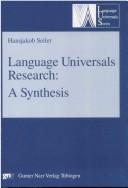
ISBN: 3823347721 3823347802 9783823347729 9783823347804 Year: 2000 Publisher: Tübingen Narr
Abstract | Keywords | Export | Availability | Bookmark
 Loading...
Loading...Choose an application
- Reference Manager
- EndNote
- RefWorks (Direct export to RefWorks)
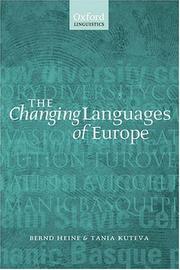
ISBN: 0199297339 0199297347 9780199297337 9780199297344 1435623673 9786611155186 0191538116 1281155187 0191711225 Year: 2006 Publisher: Oxford Oxford University Press
Abstract | Keywords | Export | Availability | Bookmark
 Loading...
Loading...Choose an application
- Reference Manager
- EndNote
- RefWorks (Direct export to RefWorks)
This book shows that the languages and dialects of Europe are becoming increasingly alike and furthermore that this unifying process goes back to Roman times, is accelerating, and affects every European language including those of different families such as Basque and Finnish. The unifying process involves every grammatical aspect of the languages and operates through changes so minute that native speakers fail to notice them. The authors reveal when, how, and why common grammatical structures have evolved and continue to evolve in processes of change that will transform the linguistic landsca
Historical linguistics --- Dialectology --- Europe --- Areal linguistics. --- Linguistic change. --- Typology (Linguistics). --- Languages. --- 800 <09> --- Taalwetenschap. Taalkunde. Linguistiek--Geschiedenis van ... --- Typology (Linguistics) --- Europa --- Taaltypologie --- Taalverandering --- Vergelijkende en algemene grammatica --- talen --- 800 <09> Taalwetenschap. Taalkunde. Linguistiek--Geschiedenis van ... --- Taaltypologie. --- Taalverandering. --- Vergelijkende en algemene grammatica. --- talen. --- Areal linguistics --- Linguistic change --- Grammar, Comparative and general --- Language and languages --- Linguistic typology --- Linguistics --- Linguistic universals --- Change, Linguistic --- Language change --- Area linguistics --- Geolinguistics --- Taalwetenschap. Taalkunde. Linguistiek--Geschiedenis van .. --- Typology --- Classification --- Taalwetenschap. Taalkunde. Linguistiek--Geschiedenis van . --- Taalwetenschap. Taalkunde. Linguistiek--Geschiedenis van
Book
ISSN: 0933761X ISBN: 9783110204384 311020438X 9783110219036 3110219034 1283627612 9786613940063 Year: 2012 Volume: 43 Publisher: Berlin De Gruyter Mouton
Abstract | Keywords | Export | Availability | Bookmark
 Loading...
Loading...Choose an application
- Reference Manager
- EndNote
- RefWorks (Direct export to RefWorks)
This book is intended to contribute to the clarification of the linguistic research area covered by the terms modal, evidential and epistemic. It sets out to demonstrate that on cross-linguistic grounds a hitherto overlooked epistemic meaning domain must be given due recognition in linguistic theory, on a par with domains such as time and number. The relevant domain is coherent, but at the same time complex in that it consists of two subdomains: one which comprises degree-of-certainty meanings, and one which comprises information-source meanings. The book offers three arguments for giving recognition to such a meaning domain. The first argument concerns the clustering of linguistic expressions with epistemic meaning into morphosyntactically delimited systems of elements. The second argument has to do with the variation pertaining to the coding of epistemic meanings, as highlighted in a semantic map of epistemic expressions. The third argument turns upon the scope properties of epistemic meanings and the morphosyntactic reflections of these properties. Finally, the book proposes a unified cognitive analysis of epistemic meaning in terms of which it attempts to account for the properties of the epistemic meaning domain as well as of individual epistemic meanings.
Lexicology. Semantics --- Psycholinguistics --- English language --- Grammar --- Linguistic universals. --- Modality. --- Semantics. --- 801.56 --- Syntaxis. Semantiek --- Taaltypologie. --- English language -- Modality. --- English language -- Semantics. --- Linguistic universals --- English --- Languages & Literatures --- English Language --- Modality --- Semantics --- 801.56 Syntaxis. Semantiek --- Language and languages --- Universals (Linguistics) --- Linguistics --- Typology (Linguistics) --- Universals --- Semasiology --- English language Semantics --- Germanic languages --- Evidentiality. --- Language Typology.
Periodical
ISSN: 21967148 09422919 Year: 1993 Publisher: Berlin
Abstract | Keywords | Export | Availability | Bookmark
 Loading...
Loading...Choose an application
- Reference Manager
- EndNote
- RefWorks (Direct export to RefWorks)
Typology (Linguistics) --- Linguistic universals --- Linguistics --- Language and languages --- Taaltypologie. --- Taaluniversalia. --- Language and languages. --- Linguistics. --- Linguistic universals. --- Sprachliche Universalien --- Sprachtypologie --- Universals (Linguistics) --- Grammar, Comparative and general --- Linguistic typology --- Sprache --- Sprachklassifikation --- Sprachentypologie --- Sprachenklassifikation --- Universalien --- Sprachuniversalien --- Linguistic science --- Science of language --- Foreign languages --- Languages --- Universals --- Typology --- Typologie --- Klassifikation --- Anthropology --- Communication --- Ethnology --- Information theory --- Meaning (Psychology) --- Philology --- Sprachbau --- Classification --- E-journals --- Literature --- Arts and Humanities --- Language & Linguistics --- Phonetics
Book
ISBN: 9783447046404 Year: 2003 Publisher: Wiesbaden : Harrassowitz,
Abstract | Keywords | Export | Availability | Bookmark
 Loading...
Loading...Choose an application
- Reference Manager
- EndNote
- RefWorks (Direct export to RefWorks)
18.84 Turkish language and/or literature. --- Balkansprachen. --- Kaukasische Sprachen. --- Makedonisch. --- Sprachkontakt. --- Taalcontact. --- Taaltypologie. --- Turkish language --- Turkish language --- Turkish language --- Turkish language --- Turkish language --- Turks. --- Türkisch. --- Dialects --- Dialects --- Dialects --- Dialects. --- Dialects. --- Balkan Peninsula. --- Balkanhalbinsel. --- Balkansprachen. --- Caucasus. --- Kaukasische Sprachen. --- Kaukasus. --- Makedonien --- Makedonisch. --- North Macedonia. --- Türkisch.
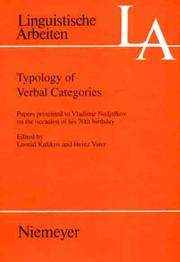
ISBN: 3484303824 3111848663 3110913755 9783484303829 Year: 1998 Volume: 382 Publisher: Tübingen Niemeyer
Abstract | Keywords | Export | Availability | Bookmark
 Loading...
Loading...Choose an application
- Reference Manager
- EndNote
- RefWorks (Direct export to RefWorks)
The typological studies of this volume are oriented towards the areas of interests of the Russian typologist Vladimir P. Nedjalkov, to whom the volume is dedicated. They deal with the typology of verbal categories. The book is divided into three parts: 1. "Ergativity and transitivity", 2. "Voice, causative and valency", 3. "Tense and mood". In all three parts of the volume instances of grammaticalization are pointed out and investigated. The studies concern various languages, e.g. English, French, German, Russian, Hungarian, Dutch, Tariana (a North Arawak language from North West Amazonia), Dumi (a Tibeto-Burman language), and Lak (a Daghestanian language).
Grammar --- Grammar, Comparative and general --- Typology (Linguistics) --- Categories, Grammatical --- Grammatical categories --- Categorization (Linguistics) --- Componential analysis (Linguistics) --- Language and languages --- Linguistic typology --- Linguistics --- Linguistic universals --- Verb --- Major form classes --- Typology --- Classification --- Verb phrase --- Verbals --- Reflexives --- Nedi︠a︡lkov, V. P. --- Nedi︠a︡lkov, Vladimir Petrovich --- Nedjalkov, Vladimir P. --- Nedjalkov, Vladimir --- Grammar [Comparative and general ] --- Verb. --- Grammatical categories. --- Nedi͡alkov, V. P. --- Philology --- 17.13 typological linguistics. --- Catégories grammaticales. --- Grammatische Kategorie. --- Sprachtypologie. --- Taaltypologie. --- Typologie (Linguistique). --- Typologie. --- Typology (Linguistics). --- Verbe (Linguistique). --- Werkwoorden. --- Nedjalkov, V.P.,
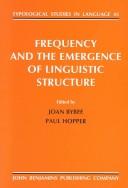
ISBN: 9027229481 9027229473 1588110281 1588110273 9786612162374 1282162373 9027298033 9789027229489 9789027298034 9781588110275 9781588110282 9781282162372 6612162376 Year: 2001 Volume: 45 Publisher: Amsterdam Benjamins
Abstract | Keywords | Export | Availability | Bookmark
 Loading...
Loading...Choose an application
- Reference Manager
- EndNote
- RefWorks (Direct export to RefWorks)
A mainstay of functional linguistics has been the claim that linguistic elements and patterns that are frequently used in discourse become conventionalized as grammar. This book addresses the two issues that are basic to this claim: first, the question of what types of elements are frequently used in discourse and second, the question of how frequency of use affects cognitive representations. Reporting on evidence from natural conversation, diachronic change, variability, child language acquisition and psycholinguistic experimentation the original articles in this book support two major principles. First, the content of people's interactions consists of a preponderance of subjective, evaluative statements, dominated by the use of pronouns, copulas and intransitive clauses. Second, the frequency with which certain items and strings of items are used has a profound influence on the way language is broken up into chunks in memory storage, the way such chunks are related to other stored material and the ease with which they are accessed to produce new utterances.
Grammar --- Frequence des mots --- Grammaire comparee et generale. --- Frequentie ( linguïstiek ). --- Taaltypologie. --- Vergelijkende en algemene grammatica. --- Frequency (Linguistics) --- Frequentie (Taalwetenschap) --- Fréquence (Linguistique) --- Grammaire comparée et générale --- Grammaire générale --- Grammaire générale et comparée --- Grammaire philosophique --- Grammaire universelle --- Grammar [Comparative and general ] --- Spraakkunst [Vergelijkende en algemene ] --- Grammar, Comparative and general --- Philology & Linguistics --- Languages & Literatures --- Comparative grammar --- Grammar, Philosophical --- Grammar, Universal --- Language and languages --- Philosophical grammar --- Linguistics --- Philology --- Frequency of occurrence (Linguistics) --- Linguistic analysis (Linguistics) --- Grammar, Comparative --- Grammar, Comparative and general. --- Linguistics. --- Acqui 2006
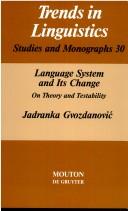
ISBN: 0899251226 3110104776 9780899251226 9783110104776 3110867443 Year: 1985 Volume: 30 Publisher: Berlin
Abstract | Keywords | Export | Availability | Bookmark
 Loading...
Loading...Choose an application
- Reference Manager
- EndNote
- RefWorks (Direct export to RefWorks)
The series publishes state-of-the-art work on core areas of linguistics across theoretical frameworks as well as studies that provide new insights by building bridges to neighbouring fields such as neuroscience and cognitive science. The series considers itself a forum for cutting-edge research based on solid empirical data on language in its various manifestations, including sign languages. It regards linguistic variation in its synchronic and diachronic dimensions as well as in its social contexts as important sources of insight for a better understanding of the design of linguistic systems and the ecology and evolution of language.
Dialectology --- Sino-Tibetan languages --- Asian languages --- Nepal --- Changement linguistique. --- Grammatica. --- Language and languages --- Language and languages. --- Linguistic change. --- Taaltypologie. --- Typologie (Linguistique). --- Typology (Linguistics). --- Variation (Linguistique). --- Variation. --- Nepal. --- Népal --- Languages. --- Langues. --- Variatie [Taalwetenschap]. --- Talen. Typologie. --- Nepal. Talen. --- Variation[Linguistiue]. --- Népal. Langues. --- Taalveranderingen. --- Typology (Linguistics) --- Grammar, Comparative and general --- Linguistic typology --- Linguistics --- Linguistic universals --- Change, Linguistic --- Language change --- Historical linguistics --- Characterology of speech --- Language diversity --- Language subsystems --- Language variation --- Linguistic diversity --- Variation in language --- Typology --- Classification
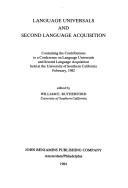
ISBN: 9027228701 9027228698 0915027097 0915027100 0915027070 0915027089 9027220700 9027220697 9780915027071 1556190964 9781556190964 9780915027088 1556190972 9781556190971 9027230137 9789027230133 9027230129 9789027230126 9789027220691 9789027220707 1283093049 9786613093042 902728640X 9789027286406 9780915027095 9780915027101 9789027228697 9789027228703 9781283093040 6613093041 Year: 1987 Volume: v. 5 Publisher: Amsterdam
Abstract | Keywords | Export | Availability | Bookmark
 Loading...
Loading...Choose an application
- Reference Manager
- EndNote
- RefWorks (Direct export to RefWorks)
This volume consists of papers presented at the Conference on Language Universals and Second Language Acquisition, University of Southern California, February 1982. Published with the papers are the remarks of the originally assigned discussants. The collection represents an important cross-fertilization between research in grammatical theory and in second language acquisition. Topics dealt with in a number of the papers include word order, markedness, core grammar, accessability hierarchies, and simplified registers. The range of universals discussed embraces phonology, syntax, semantics, and
Language acquisition -- Congresses. --- Language and languages -- Study and teaching -- Congresses. --- Linguistic universals -- Congresses. --- Tipología (Lingüística) --- Funcionalismo (Lingüística) --- Syntaxe. --- Syntaxis. --- Taaltypologie. --- Functionele taalkunde. --- Sprachtypologie. --- Funktionale Syntax. --- Funktionalismus (Linguistik) --- Grammar, Comparative and general -- Syntax --- Functionalism (Lingustics) --- Usan language --- -801.56 --- Wanuma language --- Papuan languages --- Tipología (Lingüística). --- Funcionalismo (Lingüística). --- Typologie (Linguistique). --- Fonctionnalisme (Linguistique). --- Funktionalismus (Linguistik). --- Fonctionalisme (Linguistique) --- Functionalisme (Taalwetenschap) --- Typologie (Taalwetenschap) --- 801.56 Syntaxis. Semantiek --- Syntaxis. Semantiek --- Grammar --- 801.56 --- Linguistic universals --- Language acquisition --- Language and languages --- Universals (Linguistics) --- Linguistics --- Typology (Linguistics) --- Study and teaching --- Universals --- Didactics of languages --- Oceanic languages --- Papua New Guinea --- Functionalism (Linguistics). --- Grammar, Comparative and general --- Semantiek. --- Syntax. --- Typology (Linguistics). --- Second language acquisition --- Langue seconde --- Langage et langues --- Congresses. --- Congresses --- Acquisition --- Congrès --- Etude et enseignement --- Functionalism (Linguistics) --- Syntaxe --- Typologie (Linguistique) --- Fonctionnalisme (Linguistique) --- Syntax --- Tweede taal. Onderwijs. (Congres) --- Taal. Aanleren. (Congres) --- Universaux. (Congrès) --- Deuxième langue. Enseignement. (Congrès) --- Langage. Apprentissage. (Congrès) --- Universaliën. (Congres) --- Usan [Langue]. Grammaire. --- Usan [Taal]. Spraakkunst. --- Grammar [Comparative and general ] --- Interpersonal communication in children --- Psycholinguistics
| Listing 1 - 10 of 10 |
Sort by
|

 Search
Search Feedback
Feedback About UniCat
About UniCat  Help
Help News
News